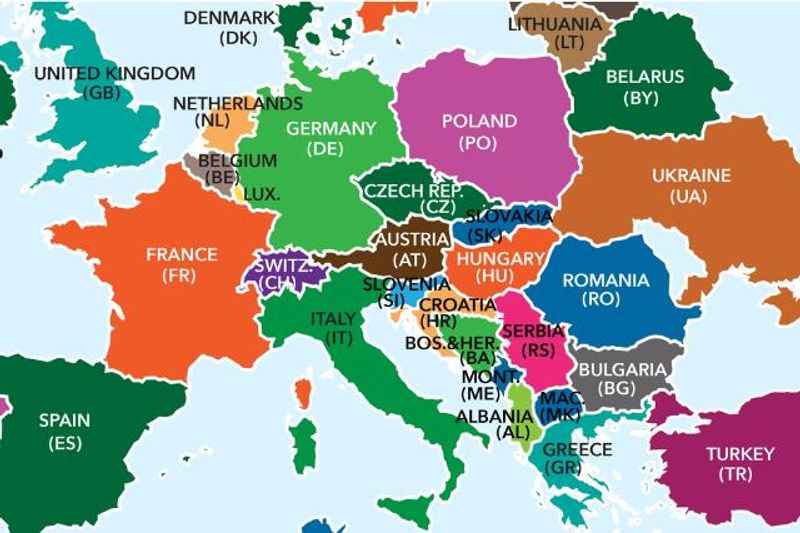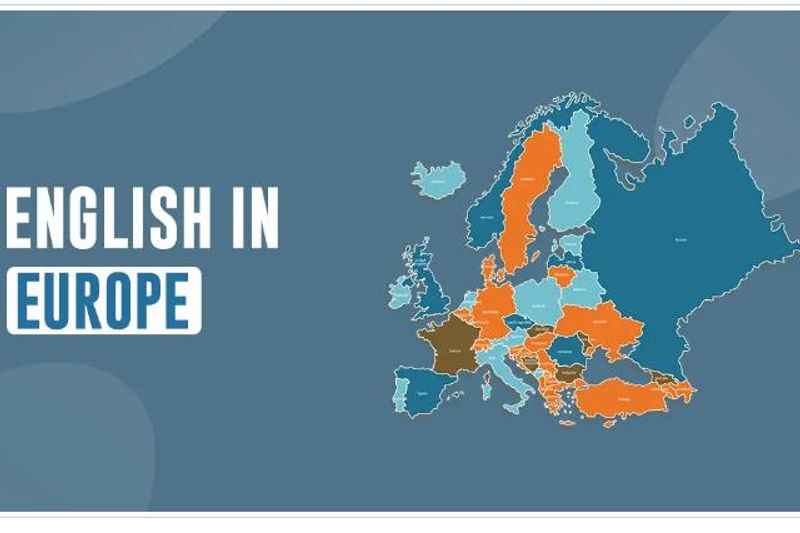The European Countries Investing Most in English Education

New research by the online language learning platform, Preply, has revealed the European Economic Area (EEA) countries investing most in English education in 2022.
As the language of business, the internet, science, and tourism, the ability to speak English can unlock an endless pool of opportunities. These include career progression, meeting new people, and traveling around the world with ease.
With many benefits to consider, it comes as no surprise that countries are investing in the English language for their citizens. But which countries invest the most in learning English and provide the most opportunities for English speakers?
About Preply

Preply’s mission is to open up the vast potential of the world for every person, business, and country. The company envisions a world where every person and business truly belongs in the global market.
For more information about the company, check out our Preply Review.
Which Countries Are Investing in English Education?
-
Germany is the country investing the most in learning English, requiring its students to learn English as a mandatory subject and having the highest number of jobs that require English speaking skills.
-
Slovenia, Lithuania, and Cyprus invest the least in learning English, with English as an optional subject. Furthermore, these countries have some of the lowest numbers of English language and international schools.
-
Berlin is the city with the highest demand for English-speaking employees with over 1,160 job vacancies requiring English proficiency on average.
-
Finally, French residents are the most interested in improving their English skills online with the highest number of Google searches monthly. These searches relate to 'learning English' and ‘English courses.'
The Top 10 European Countries for English Speakers

The language-learning platform Preply analyzed seven metrics surrounding English education in 29 EEA countries to reveal the countries investing the most and offering the most opportunities for English speakers.
*Based on EF EPI Proficiency levels: 600+ Very High, 550 - 599 High, 500 - 549 Moderate, 450 - 499 Low, and <450 Very Low.
Germany, the Netherlands, and Spain Invest the Most in English Education
Germany leads the way in investing the most in English education, with Spain and The Netherlands following close behind. Germany's English Proficiency Score is 616.
Germany is the number one country for investing in English learning. The country has the highest number of job openings requiring English proficiency (4,537) and the fourth-highest number of English Language schools at 1,316.
English is also a mandatory subject in Germany. This means that every student must study it at some point during their education.
Spain and The Netherlands come in second and third for investment in English education.
The Netherlands received the highest English proficiency score out of all the countries (663). This indicates that the average person can use nuanced and appropriate English language in social situations and read advanced English texts easily.
Spain has the highest number of international schools out of every country analyzed (274) and also has over 1,400 English language schools.
Slovenia, Lithuania & Cyprus Invest the Least in English Education
According to Preply’s analysis, the country investing the least in English is Slovenia with an English investment score of just 1.8 out of 10.
With English being an optional language, students are not required to take lessons. Furthermore, the country also has some of the lowest numbers of English language schools and international schools at 63 and 5 respectively.
In addition, Lithuania and Cyprus also made the bottom three, with both scoring fairly low across the board for English investment. They received a total English investment score of 1.9 and 2.1 out of 10 respectively.
Europe’s Top 10 Capital Cities with the Most English-Speaking Jobs

Preply’s research also investigated the best capital cities for English-proficient job seekers in Europe. These are based on each city’s average number of job vacancies requiring English.
Berlin, Warsaw, and Bucharest Have the Highest Number of English-Speaking Jobs
Berlin, Warsaw, and Bucharest are the capital cities offering the highest number of jobs requiring English.
The results showed Germany’s capital Berlin had the most job vacancies requiring English skills with 1,160 openings, which isn’t surprising considering Germany ranked number one for English investment.
Despite neither country requiring students to take English lessons at any point in their education, Poland and Romania came in second and third. Their capital cities offer 1,113 and 920 English-speaking job openings respectively.
Sources & Methodology
Preply analyzed 29 EEA countries against a series of metrics to determine which are investing the most into learning English. The metrics that were scored included whether English was a mandatory or optional language at school and the number of English language schools.
Other ranking factors included the number of international schools, Google search interest by locals wanting to learn English, each country's level of English proficiency, and the number of jobs requiring the ability to speak English. Preply then created a weighted index to determine an overall score for each country.
The Importance of English Education

English education is a vital aspect of students' learning, with English language arts playing a crucial role from elementary to high school. If you are considering teaching English overseas, this is an incredibly fulfilling and worthwhile endeavor.
For student teaching experience in Europe, the TEFL (Teaching English as a Foreign Language) route is recommended. This requires certification over a matter of weeks and allows you to teach in most English-language schools in Europe.
Or, if you want to pursue an English education program in the UK to teach natives, you can explore specialized knowledge and doctoral programs. A Master's degree is often required for current teachers seeking professional development in the UK.
English University courses encompass various aspects of literacy, writing, and language skills. Professors engage learners with innovative teaching practices and coursework to support their learning journey.
Whether on-campus or in an online program, students completing their degrees in English education are passionate about their careers as educators in school districts. Join their ranks and educate the next generation in the English language.
Amy Pritchett, Student Success Manager at Preply shared five reasons why learning English could change a person's life for the better.
1. English is the Most Useful Language for Travel
English is the most important language for travel because it serves as a global lingua franca, spoken and understood in numerous countries. It facilitates communication with people from diverse backgrounds, including hotel staff, tour guides, and fellow travelers.
Knowing English enhances accessibility to information, making travel experiences more convenient and enjoyable. With over 1.5 billion speakers worldwide, learning English will allow you to be part of the global conversation.
This will allow you to travel with ease as you will be able to communicate with over 20% of people in the world. You will also be able to enjoy English language arts and sciences while you travel.
2. English is the Most Common Business Language
English is the most common business language worldwide due to its widespread use and acceptance as a lingua franca in international trade and commerce.
Being proficient in English opens doors to global markets, fosters cross-border collaborations, and facilitates seamless communication among multinational businesses, making it an essential skill for professionals.
Therefore, being proficient in English will open up job opportunities and allow you to work almost anywhere. It can even increase your hourly wage in some instances due to its value to companies.
3. English is the Dominant Language in Academia and Science
English has become the dominant language in academia and science due to its role as a universal medium for scholarly communication. Researchers worldwide publish their findings in English journals, promoting knowledge-sharing and collaboration.
English proficiency is vital for accessing cutting-edge research and participating in the global scientific community. Learning English can give you a competitive advantage by opening the door to some of the world’s highest-rated educational institutions.
In fact, 85% of the top 20 universities in the global rankings are English-speaking. Scientists, doctors, and engineers also need to have English proficiency to be able to publish work in their industry.
This alone demonstrates how English has become the widely-adopted language of academia worldwide.
4. The Most Popular Entertainment in the World is in English
English-language entertainment, including films and TV shows, music, and literature, enjoys global popularity and widespread consumption. Hollywood movies, English songs, and best-selling novels have a massive international audience.
Understanding English unlocks a vast array of entertainment options, allowing people to enjoy diverse cultural expressions from around the world. As well as making the language more fun to learn, this will also help students immerse themselves in the culture.
5. English is the Language of the Online World
English's prevalence as the language of the online world stems from its historical dominance and the establishment of major English-based tech companies. From websites to social media, over half of the most visited web pages in the world are in English, making it the dominant language online.
This means it is beneficial to know English for effective communication, information access, and participation in the digital age. With over 1 billion internet users typing in English, you’ll be able to access many types of resources and learning platforms to strengthen your skills.
FAQs About European Students Learning English
Let's look at some frequently asked questions about English education in Europe.
How can I get student teaching experience in Europe?
To gain student teaching experience in Europe, explore English teacher programs that offer international placements, such as TEFL. Completing coursework and engaging in classroom instruction will prepare you for teaching practices abroad.
Can I teach the English language arts without a degree?
Often, a bachelor's degree in English or a related field is required to teach English language arts in various institutions around Europe. Some specialized knowledge and certifications might be necessary for specific teaching positions in European schools. That being said, you can become an English teacher in an academy for adults or an assistant teacher in a kids' school in Europe with just a TEFL certificate.
What are the main benefits of an English education program for European students?
English education programs in Europe provide a comprehensive learning experience, allowing students to develop language skills, engage in literature, and explore various English courses. Graduation from such programs opens doors to diverse career paths and opportunities for further education.
What are the most common languages to learn in the EU?
The most common languages to learn in the EU, besides English, are French, German, and Spanish. Other languages like Italian and Portuguese are also common. These languages hold significant importance in European culture, commerce, and international relations.
Summing Up: The European Countries Investing Most in English Education
EU countries like Germany, Spain, and The Netherlands invest in English education to equip their students with valuable skills and opportunities in the English-speaking world.
English language proficiency opens doors to international communication in business and everyday life.
With English fluency, European students can thrive in an increasingly interconnected global landscape, contributing significantly to their countries' progress and prosperity.
Slovenia, Lithuania, and Cyprus do not prioritize English tuition.







